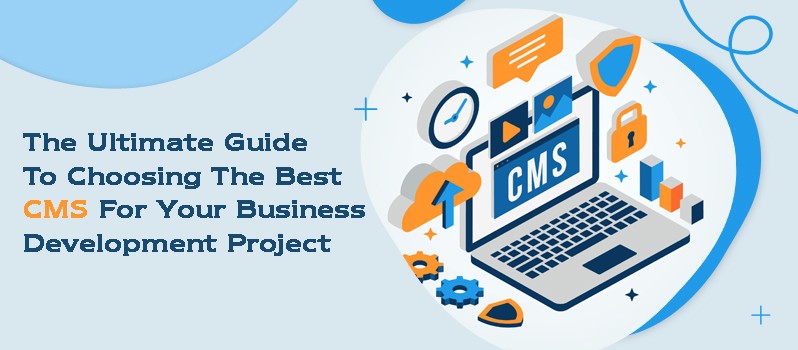The Ultimate Guide To Choosing The Best CMS For Your Business Development Project
Choosing the right CMS for your business can be a complicated task. You need to find one that is easy to use and supports the type of website you want to create, but also one with good search engine optimization. In this article, we have listed some of the best options on the market for you to consider today!
What is a CMS
In this blog post, we are going to be discussing what a CMS is and how it can be used in business development projects. We will also be outlining the different types of CMSs and their benefits for businesses.
CMS stands for “content management system”. A CMS is a software that helps manage and publish content on a website or blog. They come in many different shapes and sizes, but they all have one goal: to make creating and managing content easy. There are several different types of CMSs, but we’re going to focus on two in particular: WordPress and Joomla!
WordPress is a popular open-source content management system (CMS). It was created in 2003 by Matt Mullenweg, who currently serves as the CEO of WordPress.com. WordPress is versatile, user-friendly, and has an amazing support community. It’s perfect for smaller businesses that need a simple system that can be updated easily. Joomla! is another popular CMS. It was created in 2001 by Andrej Zdravkovic, who currently serves as the CEO of Joomla! Ltd. Joomla! is more powerful than WordPress, but it still works well for many websites. Joomla! also supports a wide range of extensions that change the appearance and functionality of the website, including: hotel booking
WordPress comes with a bunch of extra tools as well. You’ll also want to check out WordPress plugins to improve your site’s functionality and design, such as: Google Analytics
Characteristics of The Best CMS
If you’re looking to build a website or blog, you’ll need a content management system (CMS). There are many different options out there, and it can be hard to decide which one is right for your business. In this article, we’ll discuss some of the key characteristics of the best CMSs for business development projects.
First and foremost, a good CMS is easy to use. You shouldn’t have to spend hours learning how to use it, or struggling with frustrating bugs. Instead, it should be intuitive and straightforward to use. If you need help, there should be helpful documentation available online or in the software itself.
A good CMS also has features that are specific to business development projects. For example, you likely want a CMS that allows you to create custom pages and posts quickly and easily. You might also want features that make it easy to manage your contact information and track your progress.
Finally, a good CMS is reliable. You don’t want something that crashes all the time or causes other problems on your website. Instead, you want something that will stay up even during peak traffic times or when there are technical issues.
Key Considerations for Choosing A CMS
When choosing a content management system (CMS), it’s important to consider the specific needs of your business. Here are six key considerations:
1. Your audience. What type of content do you want to create and manage? Do you need a platform for creating simple blog posts, or do you need more sophisticated tools for managing a website with an editorial staff?
2. Your scale. How many pages will you be publishing, and how complex will your content be? Are you looking for a platform that can handle basic blog posts and images, or something more robust that can support full-blown websites with articles, galleries, and live chat features?
3. Your budget. Do you have the available funds to invest in a CMS? Some platforms are more expensive up front, but may offer additional features and flexibility down the line.
4. Your team’s skillset. Do your team members have experience using a CMS? If not, is there someone on your team who can help train them? Languages used in the CMS may vary, so having someone on board who can help translate content is also beneficial.
5. Your goals for the CMS. What types of features do you want the platform
How to Choose A Web Developer For Your Business Development
When starting your business development project, you’ll need to find a web developer who has the skills and experience to help you create and implement the necessary websites. It’s important to find someone who is familiar with the latest web development technologies, so you can develop your website in a way that’s both effective and visually appealing. Here are four tips to help you choose the best web developer for your business development project:
1. Ask Around
One of the best ways to find a web developer is to ask around. You can reach out to friends, family members, colleagues, or other business owners in your area and ask if they know of any good candidates. You may be surprised at how quickly word gets around about great web developers!
2. Look for Qualifications and Experience
When looking for a web developer, it’s important to look for qualifications and experience that match your needs. For example, if you’re looking for someone who specializes in e-commerce websites, make sure the candidate has completed enough e-commerce projects to prove their skills. Likewise, if you’re looking for someone with a particular design flair, be sure the candidate has experience designing websites in that style.
3. Ask About Fees and Cost Of Doing Business Once you’ve narrowed down your search to a few candidates, it’s time to get down to the nitty gritty – how much will they cost? Find out upfront what costs will be involved for the project and if there are any hidden fees. Also find out about the developer’s payment terms, including when (if ever) payment is expected.
4. Ask About The Candidate’s Track Record When you finally find a web developer that matches all of your requirements, you need to see some proof that they can actually deliver what they’ve promised. At this point, you should ask them about their track record with their previous clients and how they handled client feedback/questions. Does the programmer respond quickly? Have they been able to work with clients? Do they stick to their schedule? If the developer is a new company, you should also ask about how many projects they’re working on at this time and how many they’ve completed.
5. Request A Demo As you’ve done before now, request a demo from the candidate that shows off what he or she can do for your project. This is typically in the form of an actual website design or some type of special application (like a mobile app). You should check out the documentation and see if it fits your needs. If you are feeling particularly skeptical, make sure to check out their portfolio of previous work as well without asking for any details about it. It can be helpful to find out exactly what you’re buying with something
Conclusion
When it comes to choosing the right CMS for your business development project, there are a lot of factors to consider. In this article, we have focused on five key areas that you should take into account when making your decision: functionality, scalability, compatibility, pricing and feature set. Hopefully, this will provide you with enough information to make an informed decision about which platform is best suited for your needs. Thanks for reading!
 Previous post
6 Common WordPress Issues and How To Fix Them
Previous post
6 Common WordPress Issues and How To Fix Them



